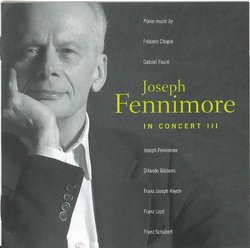Superb Pianism from Joseph Fennimore
J Scott Morrison | Middlebury VT, USA | 08/08/2005
(5 out of 5 stars)
"I missed the first two volumes of 'Joseph Fennimore in Concert' but can tell you that if they were as good as this one just released they must be pretty special. I had heard only vaguely of Fennimore before, and primarily as a composer. I read in the booklet notes that he had had the beginnings of a very promising career as a touring piano virtuoso, but gave it up because the rat race, the constant travel and self-promotion did not suit him. Plus he wanted to devote time to composing. He has indeed composed a great deal and some of his piano music -- the seven-minute 'Fantasy' -- is included in this recital.
His eclectic program consists of Orlando Gibbons' 'Three Pieces' (ca. 1611), his own 'Fantasy' (1963), Schubert's delectable A Major Sonata, D. 120 (1819), Chopin's 'Fantaisie in F Minor', Op. 49 (ca. 1840), Haydn's 'Variations in F Minor' (1793) subtitled 'sonata - un piccolo divertimento,' Fauré's sixth 'Nocturne in D Flat Major', Op. 63, No. 6 (1894) and Liszt's 'Three Études' ('Feux follets', 'Paysage', and 'Allegro agitato molto') (third version, 1847). This very diverse program of pieces is handled superbly by Fennimore whose technique is easily capable of the mechanical demands of this repertoire and, as important, his musicianship is impeccable. I cannot remember the last time I heard any keyboard music by Orlando Gibbons in concert. The six minutes of these three little pieces made me hungry for more. Such grace, such line, such luscious turns of phrase: not easy, I can tell you, to accomplish in this music.
Fennimore's 'Fantasy,' of which he charmingly says, 'I have forgotten enough of who I was and everything I thought about when writing my Fantasy (1963) to be able to treat it as the work of someone else,' is a neoclassic gem. The much-loved Schubert A Major Sonata is played simply, straightforwardly, earnestly and honestly. Fennimore lets the music speak eloquently for itself.
Having recently listened intently to several recorded versions of Chopin's 'Fantaisie in F Minor' preparatory to reviewing a performance by Shura Cherkassky, I have some background from which to state that this performance is, again, straightforward and honest and follows Chopin's markings precisely, without the swooning about that so often occurs in this and other of Chopin's pieces. It is an antidote to the too-emotional readings one hears.
Haydn's 'Variations in F Minor' have never particularly been my cup of tea, but Fennimore almost makes me believe in the music. His handling of that startling coda is exemplary. The Fauré 'Sixth Nocturne' is, however, one of my favorite pieces from the French literature and clearly is a favorite of Fennimore's as well. He plays it with tenderness and grace, paying particular attention to the quintessentially Fauréan side-slipping harmonies. This is a first-rate reading, one that I imagine I will reach for again and again.
The Three Études (Nos. V, III and X, in that order, from the 'Transcendental Études') are beautifully performed, but with rather more restraint and understatement than one often hears. Certainly 'Feux follets' benefits from the incredible delicacy of Fennimore's touch -- one can actually sense the 'Will o' the Wisp' of the title. There is, however, a slightly mechanical feel to the filigree. No such criticism is needed in his dramatically apt performance of 'Paysage' or the 'Allegro agitato molto.' This is not playing that goes over the top, a real plus in my estimation.
Summary: I was extremely pleased to make the acquaintance of Fennimore's playing with this disc. He clearly is a major pianist, however reticent he has been in his career.
Scott Morrison"


 Track Listings (8) - Disc #1
Track Listings (8) - Disc #1